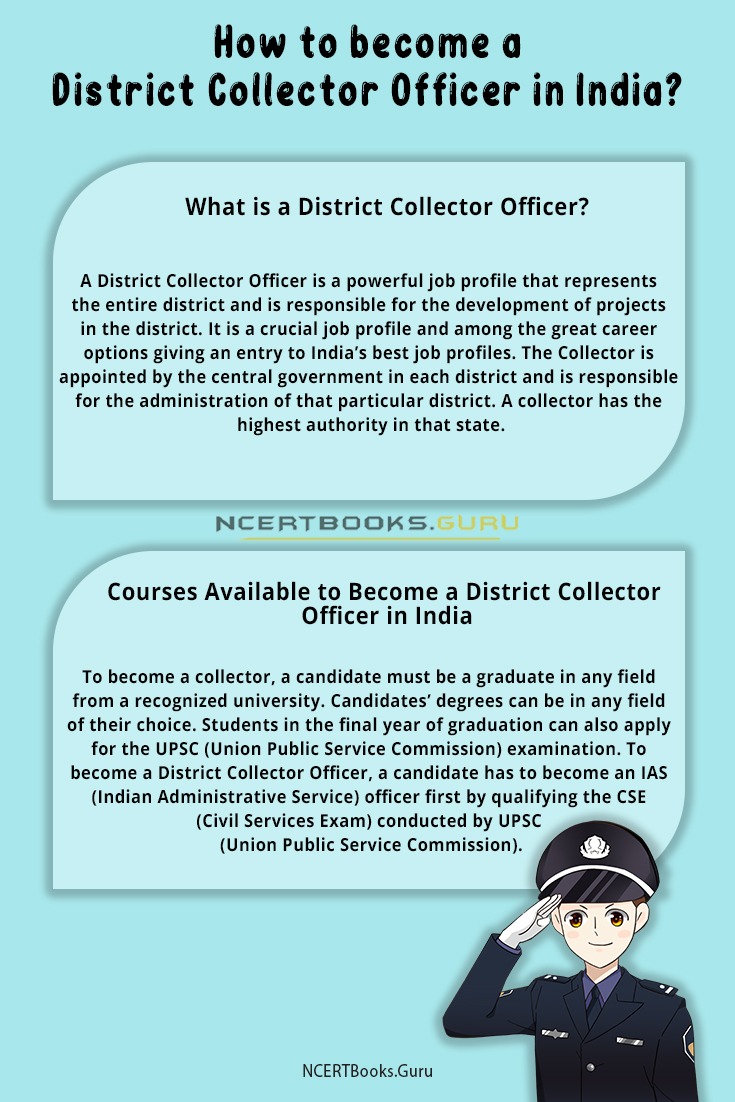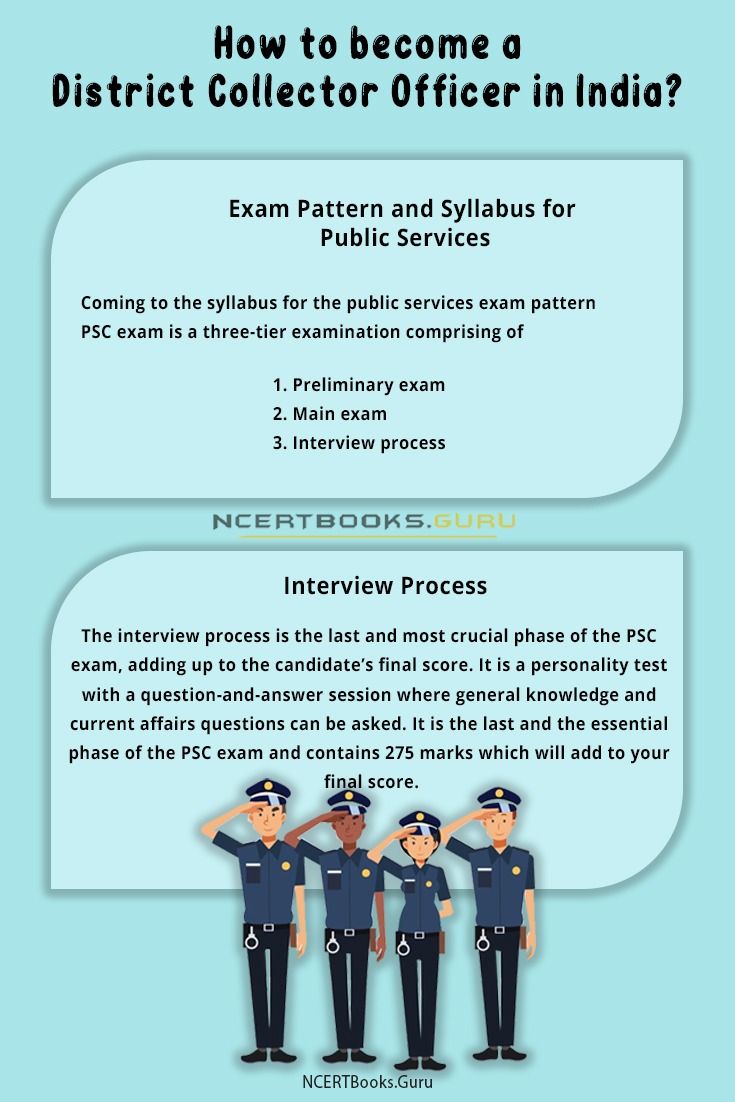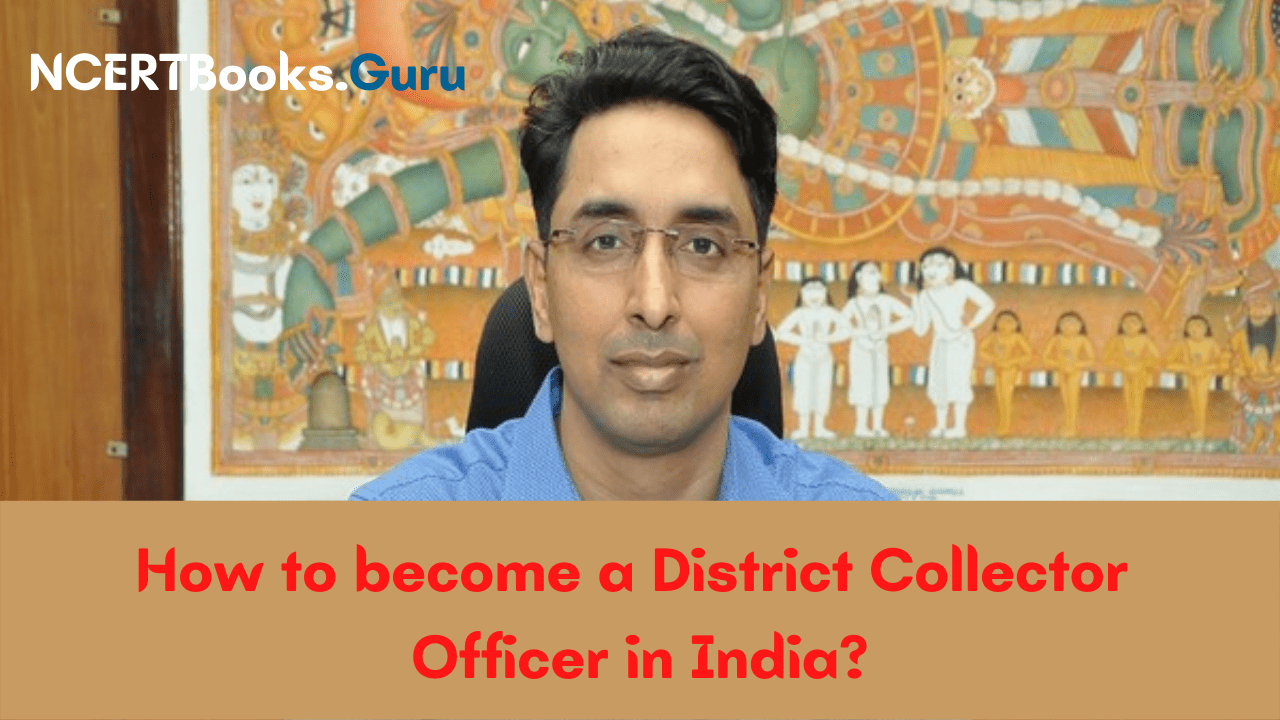How to Become a District Collector Officer in India?: If you are ambitious in civil services and look forward to serving people in your area, planning to be District Collector Officer is a perfect choice for you. A District Collector Officer is considered one of the most respected public services, and choosing this career is an excellent option.
Refer to Course Details to know more about related courses and find details like Admission Process, Eligibility Criteria, etc.
- What is a District Collector Officer?
- Courses Available to Become a District Collector Officer in India
- Eligibility Criteria to Become a District Collector Officer in India
- Exam Pattern and Syllabus for Public Services
- Skills Required for Becoming a District Collector
- Roles and Responsibilities of a District Collector
- Salary of the District Collector
- Benefits Earned By The District Collector
- Conclusion on How To Become a District Collector
What is a District Collector Officer?
A District Collector Officer is a powerful job profile that represents the entire district and is responsible for the development of projects in the district. It is a crucial job profile and among the great career options giving an entry to India’s best job profiles. The Collector is appointed by the central government in each district and is responsible for the administration of that particular district. A collector has the highest authority in that state.
To work as a District Collector Officer, one needs to clear the state’s Public Service Commission PSC exam, after which you are designated as an IAS (Indian Administrative Services) officer. Upon being the IAS officer, promotion to the District Collector Officer is attained through examinations and departmental promotions.
Courses Available to Become a District Collector Officer in India
To become a collector, a candidate must be a graduate in any field from a recognized university. Candidates’ degrees can be in any field of their choice. Students in the final year of graduation can also apply for the UPSC (Union Public Service Commission) examination. To become a District Collector Officer, a candidate has to become an IAS (Indian Administrative Service) officer first by qualifying the CSE (Civil Services Exam) conducted by UPSC (Union Public Service Commission)

Eligibility Criteria to Become a District Collector Officer in India
It is of extreme importance to know the eligibility criteria to become a District Collector Officer’s examination. Here are the details about the eligibility that must be fulfilled to appear for the civil services examination in India.
- The very first and foremost criterion is Citizenship. Candidates must hold a Citizenship of India since you can only apply for the exam if you are a permanent citizen of India and above 21 years of age.
- In terms of educational qualifications, Candidates must have a graduate degree from a recognized university to appear for the examination of District Collector Officer.
- Candidates who have completed their education either from a correspondence education or distance education are also eligible to apply for the post of District Collector.
- Candidates with technical degrees are eligible for the post of District Collector Officer.
- Candidates can apply for examinations in the final year of graduation as well.
- Candidates with professional qualifications can also apply for the examination.
- Candidates awaiting their final year results are also eligible for the Prelims Exam of the UPSC-CSE examination. For the Main examination, they have to submit proof of passing the exam.
- Students who have completed a specialist degree but undergo an internship program can apply for the post.
- Candidates who passed with the ICAI (Institute of Chartered Accountants of India), CWA (Cost and Works Accountants), or ICSI (Institute of Company Secretaries of India) Exam are also eligible to apply for the post.
- The other criteria to be kept in mind is that you can appear in the exams a maximum of three times (for general category), seven times for OBC (Other Backward Class) and no limit for SC/ST (Scheduled Caste/Schedule Tribe) candidates.
- For the age eligibility, the candidates must be 32 years for the general category, 35 years for OBC and 37 years for SC/ST.
Exam Pattern and Syllabus for Public Services
Coming to the syllabus for the public services exam pattern
PSC exam is a three-tier examination comprising of
- Preliminary exam
- Main exam
- Interview process
Preliminary Exam
The preliminary examination of PSC has two papers, namely General Studies I and General Studies Paper-II. The General Studies Paper I comprises 200 marks which decides the cutoff for the examination. At the same time, the second paper (General Studies Paper-II) is a qualifying exam that will not affect the overall markings in the Preliminary exam phase. The question paper is in two languages English and Hindi, and the duration of each paper is 2 hours. Each paper has 200 marks out of 400
The paper has objective type questions consisting of MCQs multiple-choice questions. The exam carries a one-third penalty of negative marking, which means each wrong answer carries a negative marking of 0.33 marks.
The next exam to appear for after clearing the preliminary exam is the Main Exam.
Mains Exam
The mains exam of the PSC examination comprises nine papers, out of which seven papers are compulsory, and the other two are optional (qualifying papers). After qualifying, the candidate undergoes an interview to be eligible for the interview process.
The total marks for the mains examination are 1750, and only seven papers are taken for merit ranking. For the remaining two papers, the candidates should obtain the minimum marks set by UPSC.
Interview Process
The interview process is the last and most crucial phase of the PSC exam, adding up to the candidate’s final score. It is a personality test with a question-and-answer session where general knowledge and current affairs questions can be asked. It is the last and the essential phase of the PSC exam and contains 275 marks which will add to your final score.

Read More:
- How to become an Ambassador IFS Officer in India
- How to become a DCP Deputy Commissioner of Police in India
- How to become a Forest Officer in India
Skills Required for Becoming a District Collector
- Leadership Skills
- Administrative Skills
- Decision Making Skill
- Good Communication & Interpersonal Skills
- Stress Handling Skill
Roles and Responsibilities of a District Collector
- A district collector plays an essential role in the district they serve and has multiple discharge roles and responsibilities. Some of them are mentioned below.
- The District Collector looks at the administration of the whole district.
- The District Collector is responsible for the collection of the land revenue of the district.
- The District Collector plays an essential role in crisis management and disaster management in a time of crisis in the district.
- They are responsible for taking important decisions during natural and man-made calamities.
- The district officer serves as the Chief Development Officer(CDO) of the district. The District collector is entrusted with maintaining law and order in the district.
- The District Collector oversees the maintenance of tax revenue.
- The District Collector looks after the entire election process for Local Bodies, State Legislature and the Parliament.
- They act as a Grievance Redressal Officer of a district.
- The District Collector acts as a District Head of Executive Magistrate.
- The District officer acts as a Special Officer for laws relating to arms and explosives in the particular district.
- They are alone responsible for the supply of food and civic amenities and the overall development of the district.
- The District Collector is responsible for distributing Agricultural Loan.
- The District collector collects all the pending dues of the government, which is a vital role of a Collector.
- They collect the entire statistics of that particular district.
- They look into the development of Human Resources and Rural development of that district.
- They look into the implementation of land reforms.
- They look after the welfare of farmers.
- The District Collector maintains and manages all the government property.
Salary of the District Collector
Candidates are eager to know the salary and benefits of a District Collector.
The district collector enjoys a handsome salary as well as gets many benefits and perks during their tenure.
The district collector earns a salary ranging between Rs. 94,174 to Rs. 1,72,692 per month, which they earn without benefits or perks. This salary increases with experience.
One of the benefits earned by the Collector with the salary is House Rent Allowance.
Travelling Allowance, Medical Allowance, Security, Bills, Dearness allowance (DA),
Vacation and Pension.
Benefits Earned By The District Collector
Let us look into a few of the benefits earned by the District Collector;
House Rent Allowance (HRA) – The House Rent Allowance ranges between 18 to 24% of the IAS Officer’s basic pay. The HRA differs from city to city
Travelling Allowance (TA)- based on the grade of the IAS officer and their posting, they are assigned a vehicle for commuting
Medical Allowance- IAS officers get a medical allowance as one of the benefits. The officer can reimburse their medical allowance during the time of their medical treatment
Security- To ensure the security of the IAS officer and their family the government allots bodyguards to them, bodyguards, to the
Bills- The officer gets their electricity, water, gas, and phone bills for free; if not, they get it at a subsidiary.
Dearness Allowance (DA)- Because of the dearness allowance, the salary of the IAS officers is increased by the government at intervals. The dearness allowance of the IAS is revised on a half yearly basis.
Vacation- The IAS officer is allotted a bungalow or guest house for his official and non-official trips
Pension: The IAS officer gets a good pension and other retirement benefits after their tenure are over.
Conclusion on How To Become a District Collector
A district collector is a very respectable Job as The Collector is appointed by the central government and serves the government responsibly. This position is admired by a lot of candidates who look into government jobs. The IAS officers take pride in serving the nation and take pride in being reputable citizens of the country. To become a District collector, one has to be a citizen of India, graduate above 21 years, and start preparing for the Public Service Commission Examination after their 12th standard with good general knowledge.
